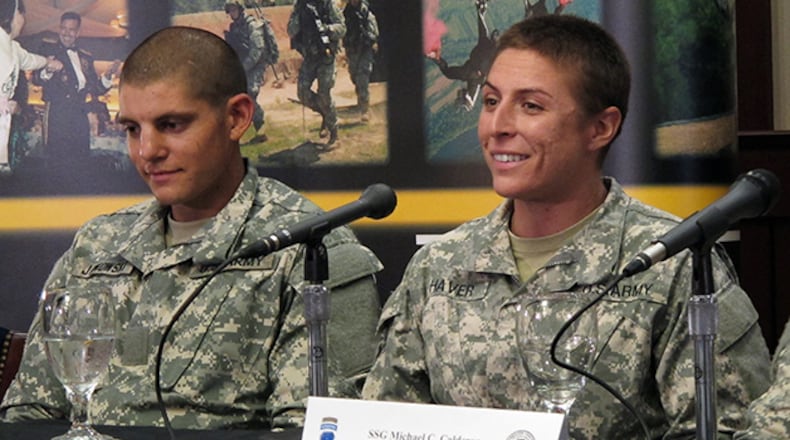Among the requirements and training for U.S. Army Rangers
- 49 push-ups
- 59 situps
- six chin-ups
- five-mile run in no more than 40 minutes.
- 12-mile foot march in three hours
- four days of military mountaineering
- 27 days of mock combat patrols.
- Three parachute jumps
Source: U.S. Army
On one particularly tough march during the grueling 62-day Army Ranger course, 2nd Lt. Michael Janowski was floundering under his heavy pack.
“I was struggling and I stopped and asked at a halfway point, ‘Hey, can anyone help take some of this weight?’” Janowski asked.
Just one soldier stepped up: 1st Lt. Shaye Haver.
Haver and Capt. Kristen Griest will make history this week, becoming the first women to take part in and pass the U.S. Army’s Ranger School. The two women - their hair cropped close - met with reporters on Thursday in an exclusive briefing here. They will join 94 men at a Ranger School graduation ceremony Friday. Nineteen women and 381 men started the Ranger school in April.
“It’s definitely awesome to be part of the history,” Haver said. “To the other females who plan on coming, I hope they come with the strong minds that it takes to get through here.”
Janowski on Thursday recalled how, as he struggled, other would-be Rangers balked when he asked for help, but not Haver.
“I got a lot of deer-in-headlight looks. A lot of people were like, ‘I can’t take any more weight.”
“Shaye was the only one to volunteer to take that weight,” Janowski said. “She took the weight off me and she carried it the last half of that [march.] She literally saved me. I probably wouldn’t be sitting here right now if it wasn’t for Shaye.”
Some of the male soldiers confessed on Thursday they were skeptical about whether the women could pass the physically and mentally demanding Ranger school. But they changed their minds when they saw Griest and Haver in action.
Both West Point graduates, Griest and Haver are shattering the military glass ceiling as top brass wrestles with placing more women in combat roles. Defense Secretary Ash Carter gave military service chiefs until Oct. 1 to tell him which combat posts should remain closed to female service-members and says they must provide documentation to justify any exclusions. Decisions are expected by Jan. 1.
Carter called the two women “trailblazers.”
Accompanied by six of their male classmates, Griest and Haver sat a long table in front of a U.S. flag on Thursday answering questions from reporters as senior Army officers looked on. The women appeared tired but relieved they had finished. There were also moments of levity as some of the soldiers describe surviving a lighting strike during their training.
Only a quarter of those who start the school finish it without having to repeat any of the phases. Griest and Haver repeated some of the training, requiring them to spend 123 days in the school, which can be finished in 62. A third woman is repeating the mountain training now.
Haver, 25, a helicopter pilot from Arizona, said fellow students inspired her to stick it out during the toughest parts of the school. Graduating with her class, she said, will be one of the highlights of her life.
Griest, 26, a military policewoman from Connecticut, said she never considered quitting, even when she faced some low points.
“I just came here to try to be a better leader and improve myself and I feel like I did that,” she said. “And for other women who have that same goal in mind… just don’t lose sight of it. And just keep reminding yourself why you are there.”
Even though they have earned the right to wear the “Ranger” tab on their uniforms, Griest and Haver aren’t allowed to join the 75th Ranger Regiment, a Special Operations unit. Still, their Ranger training dramatically improves their chances of being promoted.
Griest said she hopes military leaders take into account what she and Haver have accomplished.
“I do hope,” Griest said, “that with our performance in Ranger School we have been able to inform… what they can expect from women in the military – that we can handle things physically and mentally on the same level as men and that we can deal with the same stresses in training as the men can.”
The Ranger School — which the Army describes as its “premier combat leadership course” — teaches students how to overcome fatigue, hunger and stress as they train in the woodlands at Fort Benning, the mountains in North Georgia and a coastal swamp in Florida. The requirements include a swim test, a land navigation exam, a 12-mile march in three hours, four days of military mountaineering, three parachute jumps and 27 days of mock combat patrols.
Griest and Haver were held to the same standards as the men who are graduating with them, senior military leaders said.
“These two soldiers have proven that — regardless of gender — those standards can be met,” said Command Sgt. Maj. Curtis Arnold, the senior noncommissioned officer in charge at the Airborne and Ranger Training Brigade. “Everything is training-based in the Army. If you train hard enough and you prepare well enough, you are going to do well.”
Second Lt. Zachary Hagner of New Jersey said he was also initially skeptical about whether the women could succeed. He mentioned how Griest volunteered to carry his heavy machine gun while they were doing their mountain training. He was tired after carrying the weapon for three days.
“Nine guys were like, ‘I’m too broken. I’m too tired,’” he said. “She — just as broken and tired — took it from me with almost excitement. I thought she was crazy for that. But… that is how she is.”
About the Author
Keep Reading
The Latest
Featured




